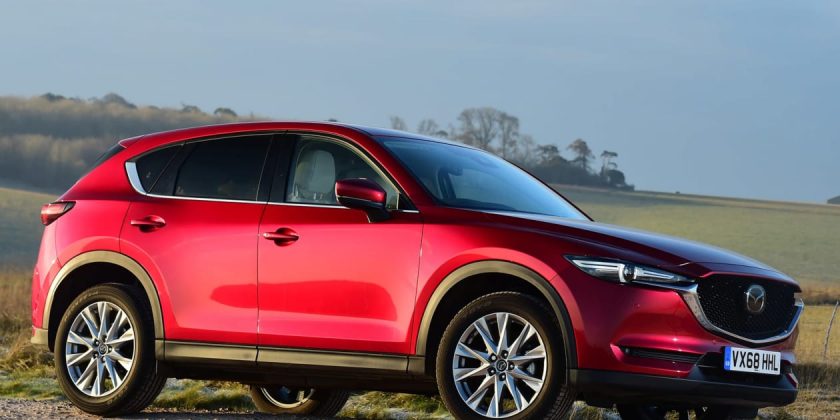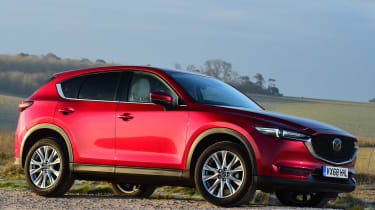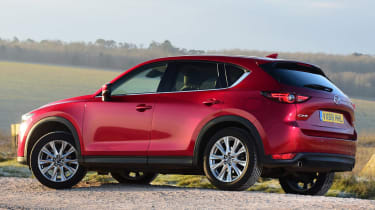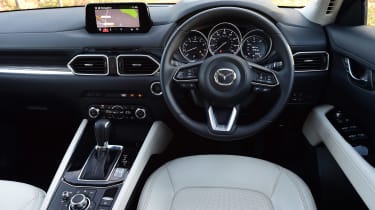A full used review on the Mazda CX-5 covering the CX-5 Mk1 (2012-2017) and CX-5 Mk2 (2017-date)
- 1Used Mazda CX-5 Mk2 review – currently reading
- 2Used Mazda CX-5 Mk1 review
Mazda isn’t a high-profile car brand in the UK, but it deserves to be because its products tend to offer the full package: sharp styling, a great driving experience, decent reliability and well designed cabins that are built to a high standard.
The brand arguably straddles the premium and mainstream sectors, so its prices can either seem good value or a touch on the high side, depending on which perspective you take. But wherever you sit, there’s no denying that the original CX-5 of 2012 was an excellent, stylish and sharp-driving SUV. The second-generation model featured here built on those strengths,
and is a far more appealing machine than many models in this class, including ones that outsell it by a fair margin.
Models covered
- Mazda CX-5 Mk1 (2012-2017) – The Mk1 was one of our favourite compact SUVs when it was released, and makes a fine used buy.
- Mazda CX-5 Mk2 (2017-date) – The Mk2 family SUV delivers practicality and plenty of kit in a package with a sporty edge.
History
The Mk2 Mazda CX-5 reached UK showrooms in July 2017, with buyers able to choose between a 163bhp 2.0-litre Skyactiv-G petrol engine, or a 2.2-litre Skyactiv-D diesel; the latter came with 148bhp or 173bhp.
More reviews
Car group tests
- Audi Q3 vs Volvo XC40 vs Mazda CX-5
- Ford Kuga vs Volkswagen Tiguan vs Mazda CX-5
In-depth reviews
- Mazda CX-5 review
Long-term tests
- Mazda CX-5 Sport Nav: long-term test review
Road tests
- New Mazda CX-5 2021 review
- New Mazda CX-5 automatic 2018 review
- New Mazda CX-5 2.2d Sport Nav review
- New Mazda CX-5 2017 review
By September 2018 revisions to the range added an automatic transmission option for the petrol engine, while tweaks to the diesel meant there was a jump in power to 181bhp for the higher-output engine. At the same time, Mazda made adaptive cruise control and blind-spot monitoring standard across the range, along with rear cross-traffic alert, lane-departure warning, auto emergency braking and high-beam assist.
In January 2019 a GT Sport Nav+ trim joined the range; 14 months later there were suspension revisions to hone the dynamics, and improved infotainment with a 10.25-inch (previously seven-inch) display.
Which one should I buy?
The diesel is ideally suited to the CX-5, and because it’s Euro 6-compliant it shouldn’t fall foul of any Clean Air Zones. The petrol engine works well, too, as do both automatic and manual transmissions. At launch there were just two trim levels: SE-L Nav and Sport Nav. Both came with LED headlights, auto lights and wipers, power-folding door mirrors, front and rear parking sensors, dual-zone climate control, a DAB radio and a seven-inch colour touchscreen with navigation.
Sport Nav cars added a reversing camera, leather trim, an eight-way power-adjustable driver’s seat, keyless entry, plus heating for the front seats and steering wheel, a powered tailgate, a head-up display and an electric sunroof. The GT Sport Nav included heated rear seats and Nappa leather trim, along with ventilated front seats.
Alternatives to the Mazda CX-5
The Mazda CX-5 is up against some stiff competition, such as the very impressive Volkswagen Tiguan and Volvo XC60 in the semi-premium segment.
If you want a small crossover that puts an emphasis on value, take a look at the Ford Kuga, which is plentiful and well equipped, good to drive and has a roomy cabin. The Kia Sportage is another great buy that’s crammed with equipment, very practical and acquits itself well dynamically – just like its cousin, the Hyundai Tucson.
The Nissan Qashqai, Peugeot 3008 and Renault Kadjar also offer decent value, while the Toyota RAV4 emphasises reliability and quality. The Skoda Karoq and its cousin, the SEAT Ateca, should also be on your shortlist, along with the Citroen C5 Aircross.
What to look for
Connectivity
Mazda fitted Apple CarPlay and Android Auto as standard from 2019. Earlier cars can add it for £300-£350
Economy
Cylinder deactivation was added to the 2.0-litre petrol engine with the manual gearbox from March 2020. This reduced CO2 emissions by 8g/km.
Towing
The CX-5 makes a great tow car. The manual 2.0-litre petrol is rated at 1,800kg, the 2.2d AWD auto at 2,100kg, and all others at 2,000kg.
Spare tyre
All CX-5s come with a tyre mobility kit. It’s possible to buy a space saver, and a full-size spare can be fitted in the boot well if the floor is raised.
Interior
The CX-5 is one of those rare cars that somehow blends the best of everything with its cabin: clarity, an interesting design and excellent quality. Yet the appeal doesn’t end there, because the seats are comfortable and supportive, and cabin space is mostly good.
Although the CX-5’s interior isn’t as roomy as some of its rivals’ cabins, the 506-litre boot is competitive, and there’s 1,620 litres with the seats down.
The infotainment system works well enough, and is operated easily via a rotary controller on the transmission tunnel. However, the graphics could be sharper. DAB, Bluetooth and sat-nav are fitted as standard, as are Apple CarPlay and Android Auto on cars built from January 2019 onwards.
Prices
Running costs
It doesn’t matter whether you buy a petrol or diesel CX-5, it’ll need servicing every 12 months or 12,500 miles.
Services alternate between minor and major, although there is some cost variation; minors are typically £200-£220, whereas major is more like £300-£320. The sixth service is the big one, with more service items due for replacement at this point, which is why the cost is pegged at around £450.
Both the petrol and diesel engines are chain-driven, so there are no cambelts to replace. The brake fluid needs to be renewed every two years, while the coolant is scheduled to be replaced after 10 years or 125,000 miles, then every five years or 62,500 miles.
Recalls
Whereas the original Mazda CX-5 has been recalled five times between 2017 and 2020, the second edition has been recalled only once so far – an impressive achievement by any measure. The campaign was launched in July 2019 and it affected 70,435 Mazdas; also included were the Mazda 3 and the Mazda 6.
Cars affected were built between January 2012 and June 2018, so this recall covers both generations of CX-5. The problem centred on the intake shutter valve, which is designed to stop the engine smoothly once the ignition has been switched off. The valve could clog up with soot, leading to fuel supply problems, which could cause the engine to stall, or prevent it from being started. The solution was to clean or replace the valve, and to update the car’s ECU.
Driver Power owner satisfaction
The second-generation CX-5 appeared in our 2020 new car Driver Power survey in an impressive fifth place. Predictably, the Mazda scored well in just about every one of the various categories, although owners weren’t so impressed by the CX-5’s brakes, navigation, servicing costs and ventilation – but there were plenty of top 20 scores in key areas such as the interior, practicality, build quality and safety.
Verdict
Within a year of its launch, the Mk2 CX-5 became Mazda’s best-selling car in the UK, and accounted for a quarter of the company’s sales globally. It’s not hard to see why the car has been a hit, although it is still a rarer sight than it arguably deserves to be. Looks are subjective, but you’ll struggle to find someone who doesn’t think that the CX-5 is distinctive and desirable. But this Japanese SUV isn’t just a pretty face, because our Driver Power survey results show it’s a car that’s usually painless to own thanks to its dependability, practicality, refinement, comfort and the fact that all editions are generously equipped. The CX-5 isn’t the cheapest car in the class, but if you can afford it, then it’s worth digging a little deeper to buy one.
Next Steps
In this review
- 1Used Mazda CX-5 Mk2 review – currently readingA full used review on the Mazda CX-5 covering the CX-5 Mk1 (2012-2017) and CX-5 Mk2 (2017-date)
- 2Used Mazda CX-5 Mk1 reviewA full used buyer’s guide to the Mazda CX-5 covering the CX-5 Mk1 (2012-2017)
Source: Read Full Article




